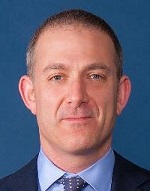 |
| ISI analyst Mark Schoenebaum |
After scoring the biggest biotech IPO on record, Axovant is now rolling up some prominent boosters among the analysts covering the field. Today, Evercore ISI analyst Mark Schoenebaum trumpeted his belief that Axovant ($AXON), which bought a discarded 5-HT6 inhibitor from GlaxoSmithKline ($GSK) for $5 million and flipped it into a public biotech months later with a market cap now hovering around $1.9 billion, has a 65% chance of success in an upcoming Phase III study. And he gives the Bermuda-based biotech a solid shot at earning peak blockbuster sales of $3.5 billion and a $60 share price--unless the Phase III for the one-trick pony fails and the stock drops to $2 a share.
Schoenebaum, who traded in his independent online spotlight covering big cap companies for a more muted role after Evercore bought ISI recently, is quick to note that Evercore profitably played the role of lead manager for the Axovant IPO, giving his bosses some skin in the game. And the analyst highlighted four clear setbacks for Axovant's sole asset, RVT-101. GlaxoSmithKline ran four mid-stage studies about 5 years ago and came up with four straight failures; three as a monotherapy and once in combination with Aricept (which Schoenebaum maintains was only technically a failure).
In the combination study the drug hit on the ADAS-cog score, with Alzheimer's patients' cognitive abilities declining at a somewhat slower rate than the placebo arm. That's the positive signal that Axovant singled out when it filed to go public, and it's looking for a repeat performance in a larger Phase III study that reads out in the second half of 2017.
The drug failed the co-primary endpoint on CDR-SB, a clinical dementia rating survey, but hit on a secondary endpoint for ADCS-ADL, which still left the failure on the record books.
Traditionally, the FDA has looked for both a cognitive improvement as well as a boost in functional performance. The CDR-SB tracks a patient's ability to remember a short shopping list, solve small problems or handle money. But the FDA has also signaled after years of setbacks in the clinic that it's willing to be more flexible in how it judges Alzheimer's drugs in the future, which could also play in Axovant's favor.
Schoenebaum also notes that the first three clear failures for the drug as a monotherapy could be a bit confusing, as there was an unexpected absence of a placebo decline and Aricept also failed. And he added that the drug may just work in combination, perhaps explaining why the drug consistently failed solo in more than 1,000 patients--which some analysts (and GlaxoSmithKline) could see as conclusive evidence that the drug doesn't work.
These 5-HT6 inhibitors have been around for years. Lundbeck has had some success, as well as failure, with its Phase III therapy Lu AE58054 in combination with donepezil, which cleared a mid-stage primary endpoint for ADAS-cog but failed on all secondary endpoints. That's the widely viewed leader in the field, which Axovant will now try to beat to the FDA.
These 5-HT6 drugs have demonstrated an ability to boost dopamine and noreprinephrine, neurotransmitters that could assist in improving cognition. But the drugs don't attempt to do what the rest of the leaders in the field are after--hit the mechanisms that drive the disease and either slow or stop the inexorable progress of the memory-robbing ailment. Most investigators at companies like Eli Lilly ($LLY), Merck ($MRK), Biogen ($BIIB) and others, believe that clusters of the toxic protein amyloid beta are the problem. None have wanted to pursue a me-better version of Aricept, which simply ameliorates symptoms of the disease as patients decline.
But Axovant's IPO filing clearly maintains that RVT-101's potential boon is in giving Alzheimer's patients greater independence for a longer period of time--the benefit in reducing costs associated with the disease. Schoenebaum's deep dive on the probability of success will give the company's true believers--as well as 29-year-old CEO Vivek Ramaswamy--a boost. But skeptics won't find it hard to poke holes in his argument for a 65% chance of success after so many failures.
That may help explain why Axovant's stock slid slightly this morning, after the upbeat review hit.